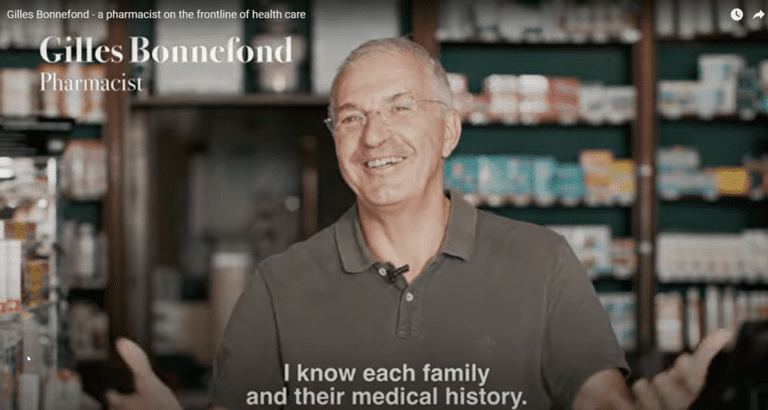Gilles Bonnefond has been practicing as a pharmacist in Montélimar, France, for more than 25 years and has witnessed the evolution of the role of community pharmacists, from the status of medication dispenser to that of primary healthcare professional. On World Pharmacists Day, Gilles’ story illustrates the frontline role that community pharmacists increasingly play in healthcare delivery.
“In the past, the main role of the pharmacist was to provide medicines. Today, we ensure access to medications, provide advice and follow patients throughout their therapy,” explains Gilles. “For many, pharmacies are often a point of entry into the healthcare system. People can come without an appointment and we are consulted on various subjects: from a small cut, to advice for someone who has had a fall, or for an elderly person who has difficulty following their treatment. . Upon request, we can vaccinate adults, check for strep throat and monitor blood pressure,” he continues.
Safe and effective medicines for everyone
When dispensing medications, Gilles and his team of pharmacists and assistants often refer to the “Pharmaceutical File”, an electronic system intended for pharmacists which provides information on a patient’s medication history. Studies show that these records have helped reduce prescribing errors and adverse drug reactions.
Pharmacists can also help combat antimicrobial resistance. Antibiotics are provided by prescription only at Gilles’ pharmacy and he and his team encourage patients to follow the antibiotic treatment prescribed by healthcare professionals.
Regulations for better access
France is one of the countries in the WHO European Region with the strictest pharmaceutical regulations. Pharmacies can only be owned by pharmacists, and licenses to operate a new community pharmacy are only granted if they meet criteria related to the geographic distribution of existing pharmacies and the number of residents they serve. The 13 pharmacies in Montélimar, for example, each serve a population of 2,500 people.
Such regulations have made it possible to equalize the distribution of pharmacies in the country and thus improve access to medicines.
A WHO report to support policy makers
The legal and regulatory framework for community pharmacies in the European Region varies considerably between countries. A recent WHO report provides policymakers with insight into the diversity of frameworks and strategies used across the Region to improve access to medicines and pharmaceutical expertise. It also provides an overview of pharmaceutical activities and services available in community pharmacies in countries in the Region.


